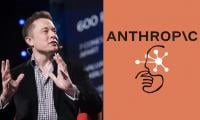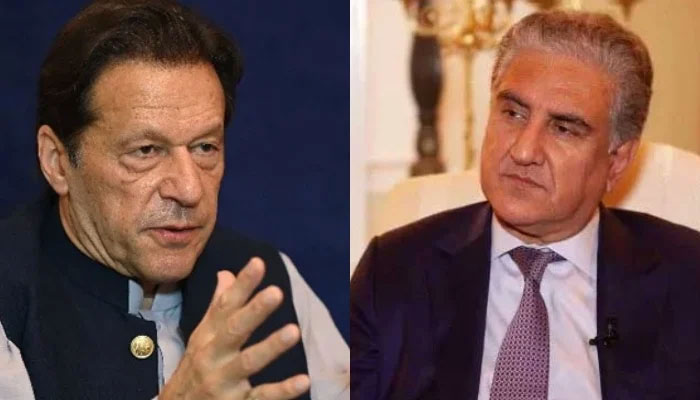Now, the chase sequence
When one of the time bombs seemingly planted for the final days of the electoral campaign exploded on Tuesday morning, there naturally was a rush of spirited reactions in the media. Anchors and leading commentators – the usual suspects – were at hand to breathlessly interpret the surprise development.
I am referring, of course, to the sentencing of former prime minister Imran Khan and his foreign minister Shah Mehmood Qureshi in the cipher case. Both were awarded 10 years in prison by the special court set up under the Official Secret Act for the breach of state secrets.
This was certainly a big news story, coming like a bolt from the blue. It electrified the political environment, giving rise to partisan assessments as to what it really meant and how it would play out.
Yes, we had another shocking twist in the tale the very next day, on Wednesday, when an accountability court sentenced Imran Khan and his spouse Bushra Bibi to 14 years in jail in the Toshakhana reference, with a fine of Rs1,540 million. But my attention, initially, is restricted to what happened on Tuesday.
Watching the show on different channels around noon, I began to wonder about the impact that the news would make on the ongoing election campaign. Surely, the voters (and that means everyone, everywhere) would be talking about this judgment made in indecent haste.
I went to the Karachi Press Club for lunch and then decided to walk the crowded streets of Saddar to try to get the feel of what was happening. This has been my practice since my early days in journalism, ages ago. A journalist friend with whom I often share my thoughts was with me.
And both of us, with our mutual interest in old Karachi, had a wonderful time. But there was no talk in any of the many casual encounters with shopkeepers and strangers about politics. There was no direct or indirect reference to the court judgment or the election campaign that is supposedly gaining momentum. This means that names that readily provoke an emotive response, such as Imran Khan or Nawaz Sharif or Bilawal Bhutto-Zardari, were just not uttered.
What I must explain here is that everyone is expected to have their political opinions and prescriptions for how to set things right. However, the idea was to not broach the subject of elections or the sentencing of Imran Khan specifically.
We only wanted to gauge the atmosphere as such and see if there were any signs of political activity. When there is a sense of excitement at the popular level, affecting the proverbial common man, it would easily become visible and audible to one who is watching the scene closely. At least I did not find any intimation of political involvement or any specific interest in elections.
Surprising, isn’t it? It is possible that I missed something that may have lurked just beneath the surface. Nor am I able to relate my experience, which admittedly extended to less than two hours, to what is being shown and debated in the media. Still, I am reporting the situation that I encountered at a time when a major development had taken place. Imran Khan being sentenced to 10 years should make waves across the various levels of public opinion – and it may have.
Theoretically, these lower-middle- and working-class people constitute a large chunk of our electorate. They are the ‘awam’ that politicians speak about so passionately and pretend to be defending their interests and cause. But these people who constitute the crowds that sometimes degenerate into mobs do not appear to have any say in how power is acquired and how it is exercised.
In fact, the people are merely observers and not participants in the entire process. They are made to believe that democracy means the holding of elections every five years. And it is only at the time of elections that they gain any importance, irrespective of who they vote for and how their votes are counted.
But there is something very special about the present electoral exercise. There is this massive side show built around the conflict between the followers of Imran Khan and the powers that be. Yet, what occasionally happens on the streets is not half as dramatic as the proceedings of courts held within the premises of Adiala Jail. That is where the two remarkable judgments were made on Tuesday and Wednesday.
If the two judgments had the undertones of tragedy, what transpired in the Adiala Jail courtroom on Thursday had a touch of melodrama. A verbal clash between Imran Khan and the former husband of his third spouse Bushra Bibi was reported like a scene from a play.
As I have suggested, a lot is happening on various fronts. There have been more instances of violence in Balochistan and Khyber Pakhtunkhwa. The pace of rallies of the PML-N and the PPP has greatly picked up, with very inventive advertising of the two parties on television.
Consider this as the chase sequence that marks the climax and the end of a movie. The elections are now only four days away – and only three for campaigning. By late night on Thursday, the votes would have been counted and the contours of the next administration will begin to emerge. There are many who are putting their money on the PML-N roaring ahead.
Meanwhile, every moment seems pregnant with possibilities. What is happening on the sidelines will not terminate with the announcement of the election results. There is that Harold Wilson quip that a week is a long time in politics. In today’s Pakistan, a day is a long time in politics, particularly during this last week of the campaign.
On February 9, shall we see the dawn of a new day? In their rallies, Nawaz and Bilawal have promised the moon. There will be time for them to recall what British politician Ken Livingstone had said: “If voting changed anything, they’d abolish it.”
The writer is a senior journalist. He can be reached at: ghazi_salahuddin@hotmail.com
-
 King Hospitalized In Spain, Royal Family Confirms
King Hospitalized In Spain, Royal Family Confirms -
 Japan Launches AI Robot Monk To Offer Spiritual Guidance
Japan Launches AI Robot Monk To Offer Spiritual Guidance -
 Japan Plans Missile Deployment Near Taiwan By 2031 Amid Growing Regional Tensions
Japan Plans Missile Deployment Near Taiwan By 2031 Amid Growing Regional Tensions -
 Meghan Markle, Prince Harry Spark Reactions With Latest Announcement
Meghan Markle, Prince Harry Spark Reactions With Latest Announcement -
 Kate Hudson Reflects On Handling Award Season With No Expectations
Kate Hudson Reflects On Handling Award Season With No Expectations -
 6 Celebrities Who Have Been Vocal About Anxiety And 'panic Attacks'
6 Celebrities Who Have Been Vocal About Anxiety And 'panic Attacks' -
 Is This The Future Of Train Travel? Robot Dogs, Drones Are Redefining Public Transit Safety Through China’s New Metro Station Deployment
Is This The Future Of Train Travel? Robot Dogs, Drones Are Redefining Public Transit Safety Through China’s New Metro Station Deployment -
 Sarah Ferguson Seeks Hollywood Backing As Epstein Files Resurface
Sarah Ferguson Seeks Hollywood Backing As Epstein Files Resurface -
 China’s AI Milestone: ByteDance’s Doubao Chatbot Hits 100M Users During Lunar New Year
China’s AI Milestone: ByteDance’s Doubao Chatbot Hits 100M Users During Lunar New Year -
 Think You Know ChatGPT? Here Are 5 AI Levels You’ve Never Seen
Think You Know ChatGPT? Here Are 5 AI Levels You’ve Never Seen -
 Bitcoin Bounces From $62,000 As On-chain Metrics Signal Prolonged Weakness: Here Is Everything To Know
Bitcoin Bounces From $62,000 As On-chain Metrics Signal Prolonged Weakness: Here Is Everything To Know -
 Elon Musk Teases Official Grok CLI For Developers As AI Rivalry With Anthropic Heats Up
Elon Musk Teases Official Grok CLI For Developers As AI Rivalry With Anthropic Heats Up -
 Jennifer Aniston Ready To Walk Down The Aisle Again?
Jennifer Aniston Ready To Walk Down The Aisle Again? -
 Sarah Ferguson’s Plan Now That Andrew Is Thrown Into The Fire: ‘She’s Not Certain She’ll Come Out The Other Side’
Sarah Ferguson’s Plan Now That Andrew Is Thrown Into The Fire: ‘She’s Not Certain She’ll Come Out The Other Side’ -
 ‘The AI Doc’: What AI Leaders Told Daniel Roher Will Keep You Up At Night
‘The AI Doc’: What AI Leaders Told Daniel Roher Will Keep You Up At Night -
 Sarah Ferguson In Hiding As Arrest Fears Grow After Andrew Was Taken Into Custody
Sarah Ferguson In Hiding As Arrest Fears Grow After Andrew Was Taken Into Custody




